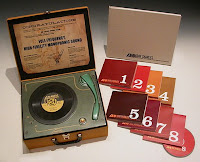Chicago has been a concert force for more than 50 years, thrilling its legion of fans with performances that never disappoint. This spring, the Rock and Roll Hall of Famers will celebrate their live legacy with a collection of previously unreleased concert recordings, which includes several deep cuts that have never appeared on any of the band’s live albums.
Chicago - Chicago: VI Decades Live (This Is What We Do) [4 CD, 2018/Hi-Res FLAC]
Chicago has been a concert force for more than 50 years, thrilling its legion of fans with performances that never disappoint. This spring, the Rock and Roll Hall of Famers will celebrate their live legacy with a collection of previously unreleased concert recordings, which includes several deep cuts that have never appeared on any of the band’s live albums.
Ray Charles - Pure Genius: The Complete Atlantic Recordings (1952-1959) [7 CD, 2005/FLAC]
Ray Charles' seminal recordings for Atlantic have been boxed once before, as the triple-disc 1991 set The Birth of Soul. That box contained 53 tracks, the best moments of what is arguably the best period of Charles' career, but Rhino/Atlantic's 2005 seven-disc sequel, Pure Genius, doesn't bother with merely the highlights: as its subtitle makes clear, this is The Complete Atlantic Recordings (1952-1959).
This is undeniably a major historical release, since it gathers all of the recordings Charles made at his creative peak, not just as a leader, but as a sideman for his saxophonist David "Fathead" Newman and sides he recorded with jazz vibraphonist Milt Jackson. Also, it's not limited to studio recordings -- live sessions, later issued on the LPs Ray Charles in Person and Ray Charles at Newport, are here too.
Lynyrd Skynyrd - Transmission Impossible (3CD, 2021/FLAC)
Ronnie Van Zant, Bob Burns, and Gary Rossington had been playing together since 1964 under various names, but in 1970 they became Lynyrd Skynyrd, and so began one of the most dynamic albeit tragic music careers in the annals of rock music. Crafting a distinctive southern sound through a creative blend of country, blues, and a British rock influence, the group became incredibly popular through the 1970s and it was only the tragic events of autumn 1977- that do not need repeating here - which stopped their onward march through the music biz.
VA - Blues Harp Meltdown - Vol 3 Legends (2 CD, 2006/FLAC)
Latest since Mountain Top's first 2-CD sets in this series, Mark Hummel's annual blues meltdown concerts are well-known, also on this side of the Atlantic. In 2004 the focus was on 'Legends' like Carey Bell and Lazy Lester. As you may imagine, you won't hear the blues' next generaton. This is traditional style as good as can be, performed by some of the old masters. Backing is supplied by Mark Huimmel's band, plus guest Steve Freund.
Recorded live at Moe's Alley, Santa Cruz, CA. - January 11, 2004'
Robert Randolph & the Family Band discography [2002-2019]
Robert Randolph & The Family Band is a multicultural American funk and soul band led by pedal steel guitarist Robert Randolph.
Robert Randolph jumped from spiritual to secular music and found an audience among blues fans, roots rock aficionados, and jam band followers with his fiery, passionate instrumental work and heartfelt music. Randolph started playing the instrument as a churchgoing teenager in Orange, New Jersey, a small city just outside of Newark. He regularly attended the House of God Church, an African-American Pentecostal denomination that had been including steel guitars (or "Sacred Steel") in services since the '30s, with the pedal steel in particular being introduced during the '70s. Randolph learned to play by watching other steel players during church services; years later, he updated that sacred basis with a secular mix of funk and soul, giving a new multicultural facelift to an instrument that had often been associated with country music.
Robert Randolph jumped from spiritual to secular music and found an audience among blues fans, roots rock aficionados, and jam band followers with his fiery, passionate instrumental work and heartfelt music. Randolph started playing the instrument as a churchgoing teenager in Orange, New Jersey, a small city just outside of Newark. He regularly attended the House of God Church, an African-American Pentecostal denomination that had been including steel guitars (or "Sacred Steel") in services since the '30s, with the pedal steel in particular being introduced during the '70s. Randolph learned to play by watching other steel players during church services; years later, he updated that sacred basis with a secular mix of funk and soul, giving a new multicultural facelift to an instrument that had often been associated with country music.
Subscribe to:
Comments (Atom)




